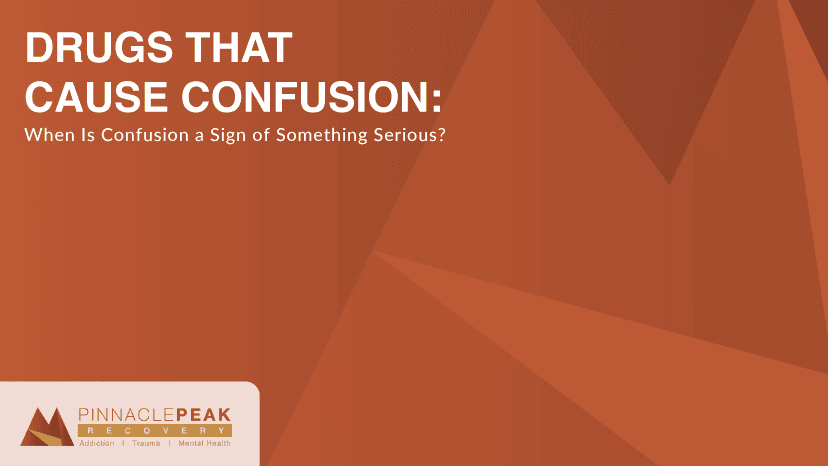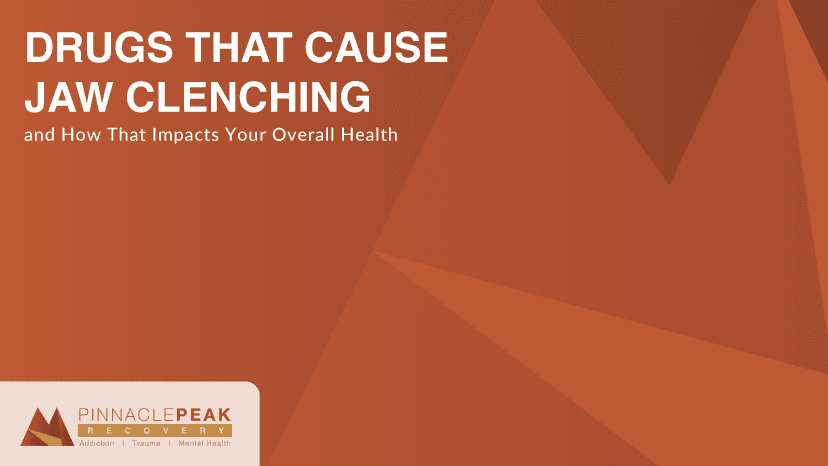Drugs That Cause Body Odor

You’re joking around with your friends at a backyard barbeque, a much-needed break after weeks of working overtime hours. Between laughs, one of them leans over and whispers in your ear, “Dude, you stink.”
If he had said it among friends, you’d laugh it off. But the awkward whispered delivery followed by his quick disappearance leaves you unsettled. Your hygiene has always been good, and nothing smells off to you. But your buddy wasn’t joking. How could this happen? You’ve been taking a new medication lately, but that couldn’t be it -- or could it?
In Arizona, 18.2% of adults used drugs illicitly (non-medical use of prescription drugs or illicit drugs) in the past year, and many are unaware of their side effects.
At Pinnacle Peak Recovery in Arizona, we feel it’s important that you feel comfortable talking about your challenges. That’s why we’ve created a down-to-earth, comfortable environment that feels like a family. When you’re ready to take the first step toward recovery from a drug use disorder or addiction, ask us about treatment plans tailored to your needs and lifestyle.
In this article, we help you understand why some drugs cause body odor and learn what you can do to address it. Find out what types of drugs and medications cause body odor and learn what you need to do to ensure you walk out the door feeling fresh and confident every day.
Can Medication Make Your Body Odor Change?
Yes, certain medications can cause body odor. Some cause body odor due to side effects such as sweating or dry mouth. Others change your body’s scent over time. And yes, a couple of medications are just plain stinky and emanate from your body in hopes of announcing themselves to any environment you walk into.
Let’s be honest - this matters! Body odor can affect your social life and psychological well-being. That’s why, when simple remedies don’t work, your doctor is prepared to help. Healthcare professionals understand this is important to your well-being. They can often provide more advanced solutions to ensure you do not have to live with body odor.
There are four basic ways medications can cause body odor:
- Drugs that alter your natural body odor: Certain drugs alter your body odor, and there are many different reasons. For example, some drugs form microflora on the skin and mucous membranes.
- Stinky medicines: Some medicines smell bad or produce foul-smelling compounds that can end up emanating from your body.
- Medications that cause sweating or excessive sweating (hyperhidrosis). This is the most common culprit behind medications that cause an unpleasant odor -- more than 400 medications list “sweating” as a side effect.Sweating alone doesn’t cause body odor. Believe it or not, sweat doesn’t stink. In fact, it has no smell at all. It’s not until sweat interacts with the bacteria on your skin (we all have it; it’s normal) that it begins to smell unpleasant.
- Certain medications cause bad breath. In some cases, a drug interferes with your body’s mechanics in a way that can lead to bad breath. For example, certain medications may reduce your saliva production, alter your local microflora, or cause gastrointestinal problems that can lead to halitosis (bad breath).
- A small handful of medications are known to cause phantom body odor perception. Some drugs are tied to phantom body odors. Phantom body odor is a situation where you smell an odor that either isn’t there or can’t be smelled by other people.
- Many medications can alter your sense of smell, making it more likely for you to not realize when an odor needs to be addressed.
Medications That May Cause Body Odor as a Side Effect
Hundreds of medications list body odor or sweating as a side effect. This doesn’t mean that the drug will cause you to have body odor, but that it is sometimes a side effect for certain people.
To find out whether your prescription medication lists body odor or sweating as a side effect, you can:
- Ask your doctor. They talk to patients every day who share first-hand experiences about the side effects of drugs and medications. They can share their opinion on whether the medication might affect you.
- Talk to your pharmacist. Pharmacists have the most up-to-date and thorough understanding of nearly all medications' side effects and indications. They are the best resource for a complete and thorough understanding of a drug’s side effects.
- Visit the Daily Med Database published by the National Library of Medicine. You can search for any medication by name to view its side effects and indications.
Is Body Odor a Side Effect of Antidepressants?
Antidepressants, especially tricyclic antidepressants, can cause increased sweating that leads to body odor. Antidepressant-induced excessive sweating (ADIES) is a common side effect of antidepressants, with an estimated 4 - 20% of people experiencing this side effect.
If you experience persistent increased sweating as a side effect of antidepressants, talk to your doctor about benztropine or cyproheptadine treatment, which can help.

List of Drugs That May Cause Body Odor
While a small handful of drugs are responsible for directly causing body odor, many more cause other symptoms that lead to body odor. Here’s a list of the ways medications can cause body odor and a list of the culprit drugs.
Drugs that are known to cause body odor:
- Antipsychotic medications
- Antihyperlipidemic agents
- Proton pump inhibitors
Drugs that can cause increased or excessive sweating:
- Antidepressants
- Cholinesterase inhibitors
- Selective serotonin reuptake inhibitors
- Opioids
- Thyroid medications
- Nonsteroidal anti-inflammatory drugs
- Amphetamines
- Adrenaline
- Pseudoephedrine
- Stimulants for Attention Deficit Hyperactivity Disorder
- breast cancer treatments
Medicines that stink: Some medications smell bad, which can cause an odor to emanate from your body. Drugs known to smell bad include:
- Bisphosphonates
- Lithium
Medicines that can lead to bad breath: Some medicines can lead to bad breath by causing gastrointestinal symptoms or decreasing saliva production. Some medications that may cause bad breath include:
- Certain alcohol antagonist drugs
- Certain antidepressants
- Certain neuroleptics (anti-psychotics)
- Certain HIV medications,
- Certain Opioids
Drugs known to cause phantom body odor perception: Some drugs can cause you to think that you smell body odor on yourself when no odor exists. This effect is called “phantom odor perception” and is tied to several types of medications, such as:
- Certain antidiabetic medications
- Certain antihyperlipidemic agents
- Certain proton pump inhibitors
- Certain prescription drugs
Shot of an attractive young woman sitting with her psychologist during her consultation in the clinic.

Tips and Solutions to Help With Drug-Induced Odors
There are many ways to resolve medication-induced body odor issues. We’ve listed some of them below, but please keep in mind that contacting your doctor may be the quickest, easiest route to relieving body odor symptoms that arise from medication.
- Use an antibacterial soap
- Use an over-the-counter antiperspirant (instead of deodorant)
- Drink plenty of water
- Wear loose, breathable fabrics (such as cotton)
- Launder clothes after each use
- Take daily showers
- Consult with your healthcare provider
Your healthcare provider is the best answer to tough body odor issues. There are several treatments available, and they can help you determine which is best for you. Some of the treatments available for body odor include:
- Adjusting your medication or dosage
- Prescribing a pharmaceutical antiperspirant or wipe to reduce sweating
- Prescribing Anti-adrenergic and anticholinergic drugs
- Electromagnetic treatments that can destroy sweat glands
- In extreme cases, surgical procedures such as sweat gland removal
- Antibiotics that can reduce the bacteria on your skin
- Botox injections
It’s important not to discontinue or adjust your medication dosage without consulting your doctor.
Can body odor signal a medical problem? Yes, in some cases, body odor can signal a medical problem. In most cases, the odor is a result of bacteria breaking down proteins in sweat. In some circumstances, though, it can hint at metabolic or other issues.
- A fruity smell may indicate diabetic Ketoacidosis.
- A musty or sweet odor, sometimes called “liver breath,” can indicate liver or kidney disease.
- An ammonia-like odor can be a sign of kidney disease.
- A musty odor present in skin, urine, and breath may signal a rare metabolic disorder known as Phenylketonuria (PKU).
- Excessive sweating and increased body odor may signal an overactive thyroid, called Hyperthyroidism.
- A yeasty smell may indicate a fungal infection (other types of infections may also emit different scents).
If you notice a sudden and unexplained change in body odor, don’t hesitate to contact your doctor. On its own, it’s not indicative of a serious health issue. However, within the context of other symptoms, it may offer clues to an underlying condition.
If you’re experiencing body odor due to drugs, there are many solutions that can help. Reach out to your doctor or healthcare professional and talk to them about it. It may feel like an awkward conversation, but it’s nothing new to them. They can help determine the best way to alleviate the troublesome side effects so you can live free of body odor.
Are you managing a drug use disorder or alcohol? Pinnacle Peak Recovery in Arizona provides customized, evidence-based treatment plans in a comfortable and natural setting. Whether you need substance use treatments, a detox center, or inpatient/outpatient treatment -- we’ll work with you to create a plan that fits your lifestyle. Please call one of our caring healthcare professionals at (866) 377-4761 to find out more about taking the first steps to life in recovery.
Is A Loved One Afflicted With Fentanyl Use Disorder?
Call Us Today
FAQs
What drug side-effects cause body order?
While a handful of drugs list “body odor” as a side effect, hundreds more can cause sweating that may lead to body odor. Additionally, many drugs cause gastrointestinal issues or decrease saliva production, leading to bad breath. A few select medications are also known to cause “phantom body odor,” a condition in which the person smells an odor that doesn’t exist in the environment.



